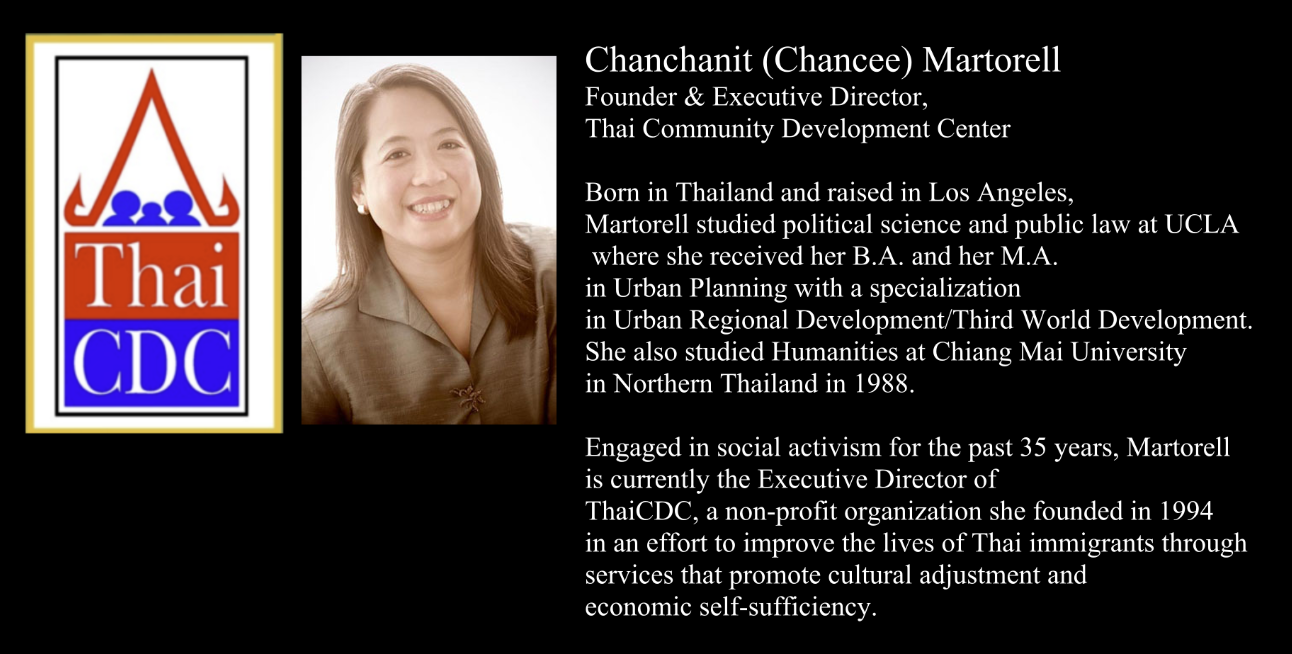Summary
Chancee Martorell, the Founder and Executive Director of the Thai Community Development Center (Thai CDC), highlights the challenges faced by Thai immigrants, including human trafficking, low wages, and limited access to healthcare. She emphasizes the need for healthcare for all and advocates for policy changes to address these issues. Chancee discusses the cultural displacement experienced by newcomers, the connection between housing insecurity and healthcare access, and the importance of fighting for comprehensive healthcare.
Transcript
“It’s truly gratifying that the Thai community is represented here, as we often feel overlooked as a minor minority. We appreciate the platform to discuss the challenges we face.
As an immigrant myself, raised in Los Angeles, I’ve witnessed the Thai immigrant population grow steadily in Southern California since the 1950s. Although we’re relatively recent compared to other ethnic immigrants, our community has grown by about 23-25% every census. Currently, there are approximately 200,000 Thai residents in Southern California, the largest population of Thai people abroad outside of Thailand.
Unfortunately, 50% of these 200,000 Thai individuals are undocumented, and a majority of them work low-wage jobs, facing economic disadvantages. The average income for a household of four is around $24,000. Sadly, our community is disproportionately affected by the scourge of human trafficking, with Thai immigrants representing the largest group of trafficked Asian Pacific individuals in the US. Additionally, 69% of Thai immigrants are medically indigent, and surprisingly, peptic ulcer is the second cause of death for Thai individuals. These chronic illnesses and untreated diseases further deteriorate their health.
Moreover, the challenges of integrating into a new country make the state of health for Thai immigrants precarious. Cultural dislocation and displacement create stress and tension within Thai households, leading to family violence and disintegration. When we discuss healthcare for Thais, it’s important to acknowledge that it operates on the margins, given our precarious state of health.
Our community center strives to assist undocumented Thai immigrants who reside in LA County. They may qualify for the My Health LA program, which provides access to healthcare. Additionally, we serve as a Covered California enrollment agency, offering low-cost healthcare options under the state’s version of Obamacare. However, since many Thais we work with are low-wage workers, they often lack health insurance due to the employment-based healthcare system. They are underpaid, sometimes below minimum wage, with no compensation for overtime or other benefits, including healthcare.
Therefore, I strongly advocate for healthcare for all, seeing it as a moral imperative. It’s crucial to adopt a broad definition of healthcare, considering the housing insecurity prevalent in the Thai immigrant community. Without access to healthcare, the challenges of housing insecurity further jeopardize their well-being.
Thai immigrants, like many newcomers, face cultural dislocation and displacement, causing stress and tension within Thai households. Unfortunately, our experience has shown that this can lead to family violence and the disintegration of families.
When discussing healthcare for Thais, it’s crucial to recognize that it exists on the margins. We are dealing with a precarious state of health. Undocumented Thai individuals in our community center have been able to receive assistance through programs like My Health LA, provided they reside in LA County. This program grants them access to necessary care. Additionally, our community center serves as a Covered California enrollment agency, offering low-cost healthcare options similar to the California version of Obamacare.
However, the majority of the Thai individuals we work with are low-wage workers. Sadly, in our country, healthcare is tied to employment. Many of these low-wage workers lack health insurance because they are employed in workplaces that pay them below the basic minimum wage and do not provide overtime compensation or other benefits, including healthcare.
Therefore, it is essential to advocate for healthcare for all, which should be viewed as a moral imperative. I particularly appreciate the initial emphasis on a broad definition of healthcare because the Thai immigrant community also faces significant housing insecurity. Without access to healthcare, this housing insecurity exacerbates their precarious situation. Furthermore, the ongoing coronavirus pandemic adds another layer of uncertainty.
We must all join the fight for healthcare for all and recognize the importance of this struggle. I am grateful for the opportunity to be part of this movement for change in our healthcare system. Thank you for having me.”
